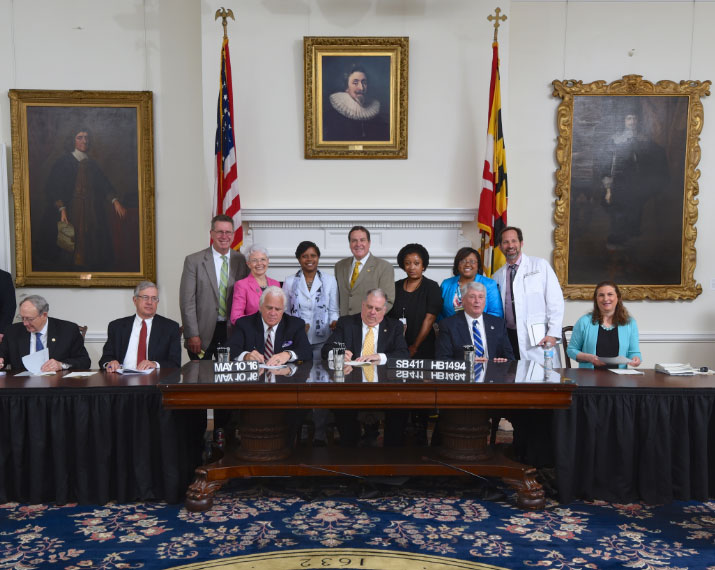Income Tax Credit for Physician Preceptors in Areas with Health Care Workforce Shortages
Following HRSA's Bureau of Health Workforce webinar on Georgia AHEC’s Preceptor Tax Incentive Program (PTIP), Dr. Richard Colgan, Professor of Family and Community Medicine, University of Maryland School of Medicine and Director of the Maryland AHEC program, set out to replicate this legislation in Maryland. The justification for this legislation in Maryland was already well documented. According to the American Medical Association 2011 Graduate Medical Education data, Maryland ranked last of the 50 states for Graduate Medical Education graduates who were likely to go on to be generalists. Furthermore, not unlike other parts of the US, Maryland has struggled to recruit and retain health care professionals in underserved areas of the state. Therefore, the primary care workforce is impacted in Maryland and ultimately the training of medical students, nursing students, etc that relied on primary care community preceptors for their required clinical rotations. In addition, University of Maryland School of Medicine fourth year medical students have an obligatory 4 week Area Health Education (AHEC) rotation with a community-based preceptor who is a licensed, uncompensated physician providing primary care teaching for medical students.
Armed with a fact sheet in hand, which included information about Georgia’s preceptor tax incentive legislation, Dr. Colgan set out to garner support and build a coalition of sponsors and supporters. He first met with Senator Addie Eckardt to ask for her guidance and legislative sponsorship. Senator Eckardt agreed to serve as the champion for the legislation and brought along other Senate colleagues. Senator Eckhart solicited a fellow Eastern Shore legislator, Delegate Sheree Sample Hughes, to lead the charge in the House and she brought along a cadre of other Delegates sponsors.

The Maryland Area Health Education Center Program, which includes two rural centers: AHEC West and Eastern Shore AHEC, and one urban, Baltimore AHEC, were immediately on board in support of the legislation, in addition to University of Maryland Baltimore and the University of Maryland School of Medicine. Dr. Colgan then reached across the City on the eastside and sought out his counterpart, winning the support of Johns Hopkins Medicine. Additional supporters included: The Maryland State Medical Society, Maryland Department of Health and Mental Hygiene, Maryland Academy of Family Physicians (MAFP), Maryland Academy of Physician Assistants, Nurse Practitioner Association of Maryland, Maryland Rural Health Association (MRHA), Maryland Chapter of the American Academy of Pediatrics, Maryland Chapter of the American College of Physicians, and the Maryland Hospital Association.
It was February 24, a cold and rainy Winter day, and time for testimony in support of Senate Bill 411 in the Miller Senate Building, in front of the Budget and Taxation Committee. Copies of testimony were made and collated for the correct number of committee members. Visits and introductions to several senators and staffers were done. Names were entered into the computer of those agreeing to give testimony and representatives from the MAHEC Program Office and Centers, Johns Hopkins Medicine, MRHA, MAFP and the Maryland State Medical Association were enthusiastically ready to speak in support of Senate Bill 411. As far as they knew, there was no opposition to the bill. Representatives sat outside the committee chamber, on the floor and chairs, and waited patiently for hours for their turn to present testimony. When the time came to present testimony, one by one they emphatically and passionately spoke of the need to incentivize preceptors who are sharing their time and expertise to shape the future of the medical and nursing fields. Representatives from the Nurse Practitioner Association of Maryland announced their support with a friendly amendment.
The same scenario played out on March 11, as testimony was read to the House Ways and Means Committee for the counterpart legislation, House Bill 1494. Yet again representatives, in support of the legislation, waited patiently for hours to testify as House Bill 1494 was slated to be one of the last for the day. In addition to Dr. Colgan, all three AHEC Centers were represented and testified at one if not both of these hearings. AHEC leaders speaking in favor of this legislation included ESAHEC Executive Director Jacob Frego, BAHEC Executive Director Michelle Clark, and Executive Director from AHEC West, Susan Stewart. Following, an exhausted group took time to express appreciation to each other and take group pictures before departing the House building.
On the evening of May 11, the last day of the 2016 Maryland State Legislative Session, Senator Eckardt excitedly notified Dr. Colgan that Senate Bill 411 had passed! According to the Bill, community preceptors may claim a credit against their income tax; $1000 per student for a required minimum of three rotations of 160 hours of community-based clinical training or $3000 to a maximum of $10,000.
The hard work of coalition building, preparing testimony, travelling to Annapolis to testify, and visiting with legislators to ask for support was over and well worth the sacrifice. On May 10, 2016, 10:30 AM, Governor Larry Hogan signed SB 411 into law at the Maryland State House.
